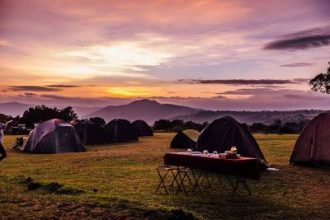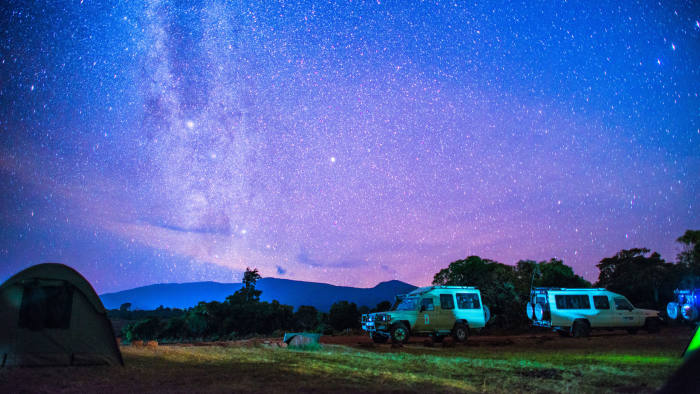
Do you want to experience Africa in a wildly authentic way? Try an adventure camp. You won’t be disappointed. We all know that camping never grows old – It reaches out to our primal need for adventure in ways that few other recreational activities can. Whether it’s out in your front yard, at a local campsite or better still, in a truly wild environment, nothing beats seating around a warm campfire, staring at the night sky, and sharing fond memories with the ones you love.
Camping is a recreational activity where participants take up temporary residence in the outdoors. You can either use tents or adapted vehicles for shelter. It is a standard holiday activity for a good number of ordinary families and those who want to have fun with nature. If you are planning for an adventure camping trip to Tanzania, the recommended camping sites include Serengeti National Park or Ngoro Ngoro Conservative Area.
Adventure camping safaris are designed to offer you a high-quality wildlife safari experience with unforgettable memories. The beauty about camping safaris is that you get to sleep under the stars and feel the wild, seductive African pulse that everyone finds so irresistible. Your camping adventure will take you along rough, adventurous roads and passing through tiny rural settlements. You will also get the chance to see incredible landscapes and abundant wildlife.
Don’t miss out on the unbeatable nature experience! Imagine yourself taking in fresh unpolluted African air, feeling the evening breeze, falling asleep to the hooting of an owl or even more exciting, waking to the roaring of a lion. The safari experience gets a lot more intense than it is when watching it on T.V. because you are right in the middle of it all the action.
Camping in Tanzania will give you a unique taste of East Africa’s nature, wildlife, and culture at a relatively affordable price. While on an adventure camping safari, you will stay in public campsites and these are located inside the park or on pirate campsites on the outskirts. The camps are usually not fenced; you are likely to bump into elephants walking between the tents or find antelopes on your way to the shower. The whole reason it is called an adventure camp.
There is provision for a waterproof two-person tent with an inbuilt mosquito net at the entrance of the door and windows. You will also have with you a thick sleeping mattress, robust camping furniture, for example, tables, chairs, cutlery and crockery. All you need to do is to sit down, relax and enjoy free nature. You will also enjoy the wildlife on an open savannah with a beautiful rift valley. Journey into Tanzania in search of phenomenal wildlife and get close to the animal’s region and beautiful nature. Let’s take camping to a whole new level with Adventure camping safaris.
What you’ll experience on an adventure camping trip

Though you could spend thousands of dollars each night on a fancy African lodge inside a nature reserve with some really breathtaking views, it’s actually Africa’s outdoor campsites that get you closer to nature, and whether it’s at the edge of a river, with hippos slouching through the river only a few meters away, or on an island filled with baobab trees, surrounded by a large cracked salt pan, or on top of a hill in the Naira desert – When you wake up in the morning and open your tent, you’re going to get the kind of view that others will pay thousands of dollars more to experience.
Proximity to wildlife
Outdoor camping often implies that sometimes, wild animals will come into your camp while you’re in your tent(s). There’s no need to worry – you’re safe behind all those canvas walls. You may be woken by the sound of hyenas laughing, elephants passing through, or even lions sniffing around. If you are someone who loves to be in touch with nature, it’ll be a really exciting experience.
Stargazing
If you’ve lived in a city all your life and are used to seeing only a few stars in the sky, prepare to be amazed when you go camping in Africa. In contrast to the light pollution synonymous with Europe and America’s major cities, Africa boasts some of the darkest and clearest night skies in the entire world – and they are filled it stars. In fact, looking up at the sky during the night is like visiting a planetarium. If you’re in, download an astronomy app before you go camping, so you can identify and track the constellations as they travel across the night sky.
The sound of the African wilderness
Going to bed surrounded by the sounds of the African bush is something you won’t forget any time soon. When you’re in a lodge or hotel, with the television on and the air conditioner running at full throttle, you’ll experience less of the nighttime than you would in an outdoor setting. When you go camping outside, you hear everything. The sound of chirping crickets, grunting hippos and the roaring lions. Sometimes it’s hard to sleep with all this sensory input, but then again, you won’t find it anywhere else in the world.
A few tips, and what to expect on your trip
You’ll most probably get a dome tent for your accommodations. Dome tents are reasonably spacious, and they are fitted with either two ordinary-sized beds, a sleeping bag, or a double bed, depending on your budget and preferences. The beds are given ample bedding, and there is usually a rush carpet on the floor and a bedside table with tissues for the larger tents. It is important to keep your tent zipped up. Make sure you close your tent each time you go in or out to keep inquisitive monkeys or insects from getting in.
Keeping clean
Your campsite will have an open-air bathroom fitted with a washable that holds an electric lamp, basin and jug. There won’t be running water, but the camp staff will provide a basin of freshly heated water when you need it. If possible, bring biodegradable toiletries that do not hurt the environment.
There also won’t be any plug points for hairdryers, electric razors or flat-irons. At some campsites, especially towards the end of the dry season, your water may attract insects, so it would be prudent to keep it covered with a small shower or towel in the evenings after your game drive or after you’ve had dinner.
If you have long hair, it would be wise to wet it with some bottled water, then lather it with shampoo before your bath, since you’ll have a limited supply of water for each shower. Though the camp staff are always willing to refill your shower if you miscalculate your remaining supply, it’s more convenient to lather then rinse than wait for a refill
Since you’ll be “roughing it,” you are going to get dusty. In places like Tanzania, you’ll have to choose between having clean feet wearing boots or dusty feet wearing sandals all day during the dry season. Worry not, it’s nothing a very soothing foot bath can’t resolve. In the cooler months (December-April), you could go for socks and light walking shoes
Staying healthy
Drink lots of water to avoid dehydration. Avoid large quantities of alcohol. Pack a small medical bag with painkillers and pills for common problems such as stomach pain, sinusitis, constipation, motion sickness, and hay fever. Don’t pack any liquid medicines because it’s highly likely they will break.
If you have any chronic health conditions, it’s best you consult your general practitioner or travel clinic before you start the trip. Be sure to pack a larger dose than you need for your condition, as well its prescription. Always inform your safari consultant about any chronic ailments. There’s a lot of dust in the air during the dry season. It may trigger allergies or irritate your nose and eyes. You’ll want to consult a pharmacist concerning possible remedies, or you could visit the country during the wet season when the dust is not an issue.
Since all the camps are unfenced, it’s not uncommon for animals to wander through, which is quite thrilling, as mentioned earlier. That said, it’s important to remember that they are wild animals. Over a 5-day camping safari, for instance, it’s likely you’ll come across elephants, honey badgers, monkeys, even leopards. While the experience is memorable, you should always listen to your guide, and make sure you never directly approach a wild animal. You’ll be issued an alarm horn that will alert the camp crew in the event of an emergency, but it’s rarely ever needed.
It’s also highly recommended that you do not take any food into your tent – the scent could draw the attention of any animal in the vicinity. You’ll also want to discard any cigarette butts responsibly or in an ashtray if it has been supplied to avoid the risk that you could start a bush fire. On your first night, it’s likely you’ll anxiously listen to every sound outside your tent during the night, but by your third or fourth, you’ll be sleeping soundly through hyenas laughs and lions roars.
Moving around
Depending on your itinerary, you’ll travel between camps either with a 4×4 game drive vehicle or light aircraft. If you are flying in, stick to the air company’s luggage weight and size restrictions. Your bags should be soft and maneuverable so they can fit into the plane’s small storage area.
Remember: small planes aren’t pressurized and they don’t have air conditioning, so you’ll need to take precautions if you are susceptible to motion sickness. If you’re travelling by road, sit as far forward as possible, for the most comfortable ride. The farther back you sit, the more you’ll be tossed around when your car hits uneven terrain.
Some cars are fitted with sockets for charging your kindle, camera, mobile phone or iPod. Be sure to purchase the right plug for the country you’ll be visiting. The electricity in Tanzania is at 220-240 volts. This is incompatible with most North American electrical appliances because they are designed to run on a 110V A.C mains supply.
Managing the heat
Without air-conditioning or a swimming pool, you may find that it gets unbearably hot in the afternoons, depending on the time of year, and where you’ll be camping. Just do what the wild animals do – find a shaded spot and take a nap. Waving your arms around will only make you hotter. You could also dip your feet into a cool bath. It is delightfully soothing. As an added measure wet a facecloth or small towel and spread it over the nape of your neck or forehead. The evaporating moisture will cool your body in no time. At about 4 o’clock in the afternoon, the heat will start to subside, and by the time you’re on your afternoon game drive, you’ll feel a lot cooler.
Avoid dark colors such as black or dark blue. These pigments don’t only attract tsetse flies, they also absorb a lot more heat than the usual safari colors such as beige, tan, and khaki, olive green and light brown. Your attire should match the dominant colors of the environment you’ll be visiting. Though most wild animals are color blind, they’re very sensitive to contrast and brightness, so colors like black and white will make you stand out, and scare them off.
If you’d like a true taste of the African wilderness, then an adventure camping safari is the way to go. It’ll give you an enjoyable and memorable experience set in one of the African continent’s most beautiful and pristine environments. True, you may have to give up a swimming pool, spa treatments and air conditioning, but you’ll gain a crowd-free chance to experience nature and reconnect with your loved ones.
